Worldwide Terrorism & Crime Against Humanity Index
Forces for Evil:
Milosevic & Company
Law OKs Arrest of Milosevic Aides
By DUSAN STOJANOVIC
BELGRADE, Yugoslavia (AP) - The Yugoslav Parliament passed a law Thursday that removes legal obstacles for the arrest and extradition of top associates of former President Slobodan Milosevic and other war crimes suspects to the U.N. tribunal.
Hours later, one of the suspects, former Serbian interior minister Vlajko Stojiljkovic, shot himself in the head in front of the downtown federal parliament building. Stojiljkovic, who headed the police during Milosevic's reign, was undergoing medical treatment in a hospital, hospital officials said.
Serbian Prime Minister Zoran Djindjic said passage of the law should satisfy the tribunal's demands for extradition of indicted suspects and open the way for the renewal of U.S. financial aid, which is on hold until Secretary of State Colin Powell certifies that Yugoslavia is cooperating with the Netherlands-based court.
The State Department said Thursday that Powell had not yet made a decision on that issue. A spokesman for the U.N. court criticized the narrow scope of the law, which applies only to suspects who have already been indicted; he emphasized that that Yugoslavia's cooperation should be ``complete and unconditional.''
``We are more interested in concrete actions, and that means the apprehension and transfer of individuals who have been at large for unacceptable periods of time,'' tribunal spokesman Jim Landale said in The Hague. ``We will wait and see.''
The extradition law - which applies to about 20 suspects hiding in Yugoslavia - was approved by an 80-39 vote in the 138-seat lower parliament chamber, with the other deputies absent. The 40-seat upper house approved the law Wednesday and it will take effect upon publication in the official gazette, expected within days.
Before the vote, Yugoslav Interior Minister Zoran Zivkovic, who is in charge of police, predicted quick action.
``It can be expected that all the suspects will be handed over to The Hague tribunal by May 1,'' Zivkovic said.
To satisfy a demand by lawmakers from Montenegro, the smaller of Yugoslavia's two republics, who are former allies of Milosevic, the law applies only to suspects already indicted by the U.N. tribunal. Any indicted later would be tried by Yugoslav courts, it says.
The law - strongly opposed by allies of Milosevic, who was extradited to the court last year - allows a district court judge to issue warrants and order police to detain suspects. A suspect's transfer to the tribunal would occur within a few weeks, allowing time for appeal.
The suspects likely to be extradited first are top Milosevic associates indicted along with the ex-president in connection with atrocities during the 1998-99 crackdown on ethnic Albanians in Kosovo.
They include Gen. Dragoljub Ojdanic, a former army commander and Nikola Sainovic, a former security adviser; and Stojiljkovic, who shot himself Thursday.
One of the most wanted suspects, Bosnian Serb wartime military leader Gen. Ratko Mladic, is believed to be hiding near Belgrade, in Yugoslavia. He was indicted for genocide in 1995 along with former Bosnian Serb political leader Radovan Karadzic, who is thought to be in Bosnia.
In addition to allowing extradition, the law will also give U.N. prosecutors access to archives, witnesses and other sources relevant to investigating war crimes.
Djindjic, who had faced tough opposition from nationalists and supporters of Milosevic for advocating cooperation with the tribunal, said the law will resolve ``all the problems we had with The Hague court and the American administration.''
The law's passage removes the major obstacle cited opponents of extraditions, including Yugoslav President Vojislav Kostunica, who has stressed that suspects should not be sent to the U.N. court without a law regulating the process. Lawmakers from Kostunica's party voted in favor of the bill Thursday, leaving only Milosevic allies against it.
The leaders of Serbia, the larger of Yugoslavia's republics, effectively set the country's policy. Djindjic was the key architect of Milosevic's arrest and extradition, which was carried out despite resistance from rivals. Milosevic is now on trial for his alleged role in atrocities committed by his troops in Kosovo, Bosnia and Croatia.
The United States has demanded that the other suspects also be handed over to the U.N. court. The U.S. Congress had set a March 31 deadline for economically struggling Yugoslavia to cooperate with the tribunal or lose tens of millions of dollars in financial assistance and U.S. support for loans from international organizations.
With the deadline passed, no U.S. assistance checks can be written for Yugoslavia until Powell certifies the country's compliance.

Slobodan Milosevic
President of the Republic of Serbia
Indicted war criminal. In custody.
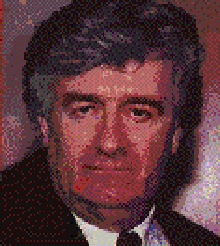
Radovan Karadzic
President of the Serbian Democratic Party of BiH.
Indicted with war crimes and crimes against humanity.
Charged (November 16, 1995) with genocide for killing up to 6,000 Muslims in Srebrenica in July 1995. Also, charged (July 25, 1995) for siege of Sarajevo and use of U.N. peacekeeping soldiers as hostages. Warrant for his arrest has been issued by the War Crimes Tribunal.
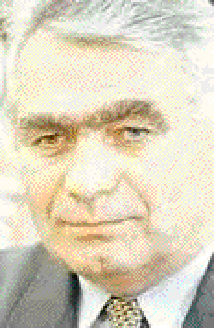
Momcilo Krajisnik
Aide to Radovan Karadzic
Detained on April 3, 2000.
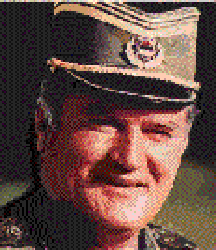
Ratko Mladic
General of JNA, former commander of JNA forces in Knin and Banja Luka
currently commander of Serbian troops in BiH.
Indicted with war crimes and crimes against humanity.
Charged (November 16, 1995) with genocide for killing up to 6,000 Muslims in Srebrenica in July 1995. Also, charged (July 25, 1995) for siege of Sarajevo and use of U.N. peacekeeping soldiers as hostages. Warrant for his arrest has been issued by the Tribunal.
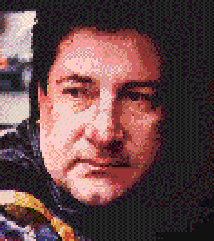
Dusan Tadic
Indicted war criminal. In custody.
On May 7, 1997, the International Criminal Tribunal for the Former Yugoslavia convicted Dusan Tadic of Crimes Against Humanity. He is convicted of 11 of 31 counts of war crimes and other counts.
Charged (February 13, 1995) by the International Yugoslavia Tribunal in The Hague (the first international war crimes trial since the Nuremberg and Tokyo trials following World War II.) The 38-year-old Tadic is charged with "the collection and mistreatment, including killing and rape, of civilians within and outside the Omarska camp." In one fatal case, U.N. officials have said, Tadic and his cohorts beat three prisoners unconscious and then forced a fourth to bite off the others' testicles. Tadic reportedly moved to Germany on a Muslim prisoner's passport in 1993 and was recognized by other Muslims, who reported him to police.
The German government is expected to pass a law allowing for his extradition in March.
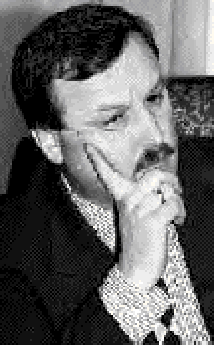
Milan Martic
leader of militant Serbs in Croatia
Charged (July 25, 1995) with ordering cluster bomb attacks on Zagreb, Croatian capital which killed at least seven civilians.
Warrant for his arrest has been issued by the Tribunal.
Martic is still at large.
Retired Yugoslav Vice Admiral
Surrenders to War Crimes Tribunal
BELGRADE, Nov 12, 2001 (Xinhua via COMTEX) -- A retired vice admiral of the former Yugoslav navy, Miodrag Jokic, flew to The Hague Monday to surrender to the International Criminal Tribunal for the former Yugoslavia (ICTY), which has indicted him of atrocities in the Croatian war in 1991, the Tanjug news agency reported.
Jokic, 66, was accompanied by his wife Stanka, daughter Sanja, and Serbian Interior Minister Dusan Mihajlovic on his trip from Belgrade to The Hague.
Jokic and three other officers of the former Yugoslav military were charged by the Hague court with crimes against humanity in the war in the former Yugoslavia when the Yugoslav navy shelled the world-famous port town of Dubrovnik, a UNESCO World Heritage site, killing 43 civilians and destroying many cultural relics.
Prior to his departure from Belgrade, Jokic spoke to reporters at the airport, denying he had committed any war crimes.
He noted that the documents he was carrying with him to The Hague would prove his innocence.
Jokic was the second of ICTY indictees to hand himself over to the war crimes tribunal since the court was established in 1993.
Pavle Strugar, a retired general of the former Yugoslav military, turned himself in to the Hague court October 21.
Also aboard the plane was Mirjana Markovic, former Yugoslav President Slobodan Milosevic's wife, who was traveling to visit her husband under custody in The Hague.
Copyright 2001 XINHUA NEWS AGENCY
Other War Criminals Still At Large
Zeljko Meakic
The commander of the Omarska concentration camp in northern Bosnia-Herzegovina.
He is charged (February 13, 1995) with genocide for his role in the 'ethnic cleansing' of Serbian-held regions of Bosnia, together with a charged with atrocities at Omarska camp.
Goran Borovnica
Bosnian Serb.
Charged (February 13, 1995) with expelling Muslims to various camps and killing and raping civilians near Omarska.
Veselin Sljivancanin
Yugoslav Army officer
Held responsible (November 7, 1995) for killing 261 non-Serbs rounded up at hospital in Vukovar, Croatia.
Milan Mrksic
Yugoslav Army officer
Held responsible (November 7, 1995) for killing 261 non-Serbs rounded up at hospital in Vukovar, Croatia.
Miroslav Radic
Yugoslav Army officer
Held responsible (November 7, 1995) for killing 261 non-Serbs rounded up at hospital in Vukovar, Croatia.
Dragan Nikolic
Serb commander of Susica camp in Bosnia.
Charged (November 4, 1994) with genocide for killing, torturing Muslims.
Mirko Babic
Serb.
Charged (February 13, 1995) with atrocities at Omarska camp.
Zdravko Govedarica
Serb.
Charged (February 13, 1995) with atrocities at Omarska camp.
Momcilo Gruban
Serb.
Charged (February 13, 1995) with atrocities at Omarska camp.
Milojica Kos
Serb.
Charged (February 13, 1995) with atrocities at Omarska camp.
Miroslav Kvocka
Serb.
Charged (February 13, 1995) with atrocities at Omarska camp.
??? Gruban
Serb.
Charged (February 13, 1995) with atrocities at Omarska camp.
Nedeljko Paspalj
Serb.
Charged (February 13, 1995) with atrocities at Omarska camp.
Milan Pavlic
Serb.
Charged (February 13, 1995) with atrocities at Omarska camp.
Dragoljub Prcac
Serb.
Charged (February 13, 1995) with atrocities at Omarska camp.
Milutin Popovic
Serb.
Charged (February 13, 1995) with atrocities at Omarska camp.
Drazenko Predojevic
Serb.
Charged (February 13, 1995) with atrocities at Omarska camp.
Mladen Radic
Serb.
Charged (February 13, 1995) with atrocities at Omarska camp.
Zeljko Savic
Serb.
Charged (February 13, 1995) with atrocities at Omarska camp.
Nikica Janjic
Serb.
Doubly charged with atrocities at Omarska (February 13, 1995) and Keraterm (July 21, 1995) camps.
Dusan Knezevic
Serb.
Doubly charged with atrocities at Omarska (February 13, 1995) and Keraterm (July 21, 1995) camps.
Dragomir Saponja
Serb.
Doubly charged with atrocities at Omarska (February 13, 1995) and Keraterm (July 21, 1995) camps.
Zoran Zigic
Serb.
Doubly charged with atrocities at Omarska (February 13, 1995) and Keraterm (July 21, 1995) camps.
Dusko Sikirica
Serb commander of Keraterm prison camp.
Charged (July 21, 1995) with atrocities at Keraterm camp.
Predrag Banovic
Serb.
Charged (July 21, 1995) with atrocities at Keraterm camp.
Nenad Banovic
Serb.
Charged (July 21, 1995) with atrocities at Keraterm camp.
Damir Dosen
Serb.
Charged (July 21, 1995) with atrocities at Keraterm camp.
Dragan Fustar
Serb.
Charged (July 21, 1995) with atrocities at Keraterm camp.
Dragan Kondic
Serb.
Charged (July 21, 1995) with atrocities at Keraterm camp.
Dragan Kulundzija
Serb.
Charged (July 21, 1995) with atrocities at Keraterm camp.
Goran Lajic
Serb.
Charged (July 21, 1995) with atrocities at Keraterm camp.
Nedjeljko Timarac
Serb.
Charged (July 21, 1995) with atrocities at Keraterm camp.
Blagoje Adzic
Retired General of the JNA and former Minister of Defense of Yugoslavia
and Chief of Staff of the JNA.
Dragoslav Bokan
a Serbian paramilitary leader.
Mirko Jovic
a Serbian paramilitary leader.
Zivota Panic
General and Chief of Staff of the JNA and former Acting Minister of Defense
of Yugoslavia.
Zeljko Raznjatovic, also known as 'Arkan'
a Serbian paramilitary leader; commander of the Tigers
(also wanted by Interpol for crimes committed in Western Europe).
Vojislav Seselj
a Serbian paramilitary leader; President of the Serbian Chetnik Movement
and the Serbian Radical Party (SRS). Commander of White Eagles
Goran Jelisic (nickname 'Adolph')
acting commander of Luka prison camp at Brcko in Bosnia.
Charged (July 21, 1995) with genocide, murder, and violations of the customs of war.
Ranko Cesic
Bosnian Serb
Charged (July 21, 1995) with killings, atrocities at Luka prison camp.
Slobodan Miljkovic
Serb
Charged (July 21, 1995) with atrocities against Muslims and Croats during 'ethnic cleansing' of Bosanski Samac.
Blagoje Simic
Serb
Charged (July 21, 1995) with atrocities against Muslims and Croats during 'ethnic cleansing' of Bosanski Samac.
Milan Simic
Serb
Charged (July 21, 1995) with atrocities against Muslims and Croats during 'ethnic cleansing' of Bosanski Samac.
Miroslav Tadic
Serb
Charged (July 21, 1995) with atrocities against Muslims and Croats during 'ethnic cleansing' of Bosanski Samac.
Stevan Todorovic
Serb
Charged (July 21, 1995) with atrocities against Muslims and Croats during 'ethnic cleansing' of Bosanski Samac.
Simo Zaric
Serb
Charged (July 21, 1995) with atrocities against Muslims and Croats during 'ethnic cleansing' of Bosanski Samac.
Ivica Rajic
Bosnian Croat militia leader
Charged (August 29, 1995) with killing Muslims during attack on Bosnian village of Stupni Do.
Zejnil Delalic
Bosnian Muslim
Charged (March 22, 1996) with war crimes committed at Celebici prison camp in central Bosnia.
Hazim Delic
Bosnian Muslim
Charged (March 22, 1996) with war crimes committed at Celebici prison camp in central Bosnia.
Esad Landzo
Bosnian Muslim
Charged (March 22, 1996) with war crimes committed at Celebici prison camp in central Bosnia.
Zdravko Mucic
Bosnian Croat.
Held in custody at Scheveningen, The Hague.
Charged (March 22, 1996) with war crimes committed at Celebici prison camp in central Bosnia.
And on November 13, 1995, The War Crimes Tribunal charged six leading Bosnian Croat officials with war crimes and crimes against humanity. The Hague tribunal said Blaskic, Kordic and the others ``are allegedly responsible for the persecution on political, racial and religious grounds of the Bosnian Muslim population of the Lasva valley area of central Bosnia between May 1992 and May 1993 (~bosnia/criminal/croatmore.html" For more information).
The names of those six persons are: